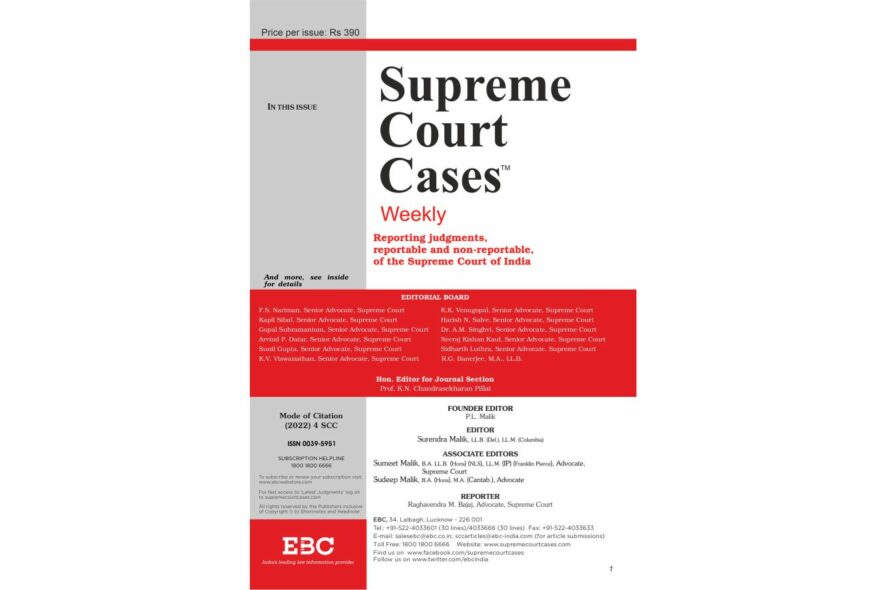Army Act, 1950 — Ss. 125, 126, 69, 3(ii) and 70 — Criminal trial — Concurrent jurisdiction of court martial under Army Act and criminal courts under CrPC: When Designated Officer/Commanding Officer impliedly declined to exercise discretion to conduct trial in court martial. Trial by criminal court under CrPC, held, mandatory. In a case of concurrent jurisdiction, when court martial has impliedly declined to conduct trial, criminal court cannot direct the court martial to do the same. [State of Sikkim v. Jasbir Singh, (2022) 7 SCC 287]
Civil Procedure Code, 1908 — Or. 41 R. 27 — Admissibility of additional evidence in appellate court not adduced in the court of original jurisdiction: Admissibility of additional evidence under Or. 41 R. 27 CPC does not depend upon the relevancy of the issue on hand, or whether the applicant had an opportunity for adducing such evidence at an earlier stage or not, but it depends upon whether or not appellate court requires the evidence sought to be adduced to enable it to pronounce judgment or for any other substantial cause. That is, whether such additional evidence has a direct bearing on pronouncement of the judgment. [Sanjay Kumar Singh v. State of Jharkhand, (2022) 7 SCC 247]
Constitution of India — Arts. 21, 32 and 226 — Constitutional/Public Law Torts/Public Safety — Violation of life and personal liberty: Where life and personal liberty have been violated, absence of any applicable statutory provision(s) for compensation is of no consequence. Right to life guaranteed under Art. 21 is the most sacred right preserved and protected under the Constitution, violation of which is always actionable and there is no necessity of any statutory provision as such for preserving that right. Thus, a writ petition seeking compensation is maintainable. Furthermore, Art. 21 has to be read into all public safety statutes, since prime object of public safety legislation is to protect individual and to compensate him for loss suffered. Duty of care expected from State or its officials functioning under public safety legislation is very high. [Sanjay Gupta v. State of U.P., (2022) 7 SCC 203]
Constitution of India — Arts. 300-A and 226 — Right to property: Deprivation of property can only be permitted when and to the extent it is strictly in compliance with applicable law. Land reserved for public purpose under Town Planning law. Lapse of acquisition due to inaction of executive to acquire land within prescribed statutory time period cannot be interfered with by Court contrary to scheme of the applicable statute. [Laxmikant v. State of Maharashtra, (2022) 7 SCC 252]
Education Law — Professional Colleges/Education — Medical and Dental Colleges — Reservation of seats/Quota/Exemption/Priority in Medical/Dental Institutions: In this case, directions were issued to implement roster point-based reservation for preferential candidates as followed by JIPMER in all AIIMS institutes. However, roster points need not be similar to that of JIPMER. This order directed to be applicable for admission from year 2022. Students Assn. [AIIMS v. AIIMS, (2022) 7 SCC 201]
Insolvency and Bankruptcy Code, 2016 — Ss. 8, 9, 5(20), 5(21), 3(6) and 3(12) — Procurer/purchaser of services/goods from corporate debtor by rendering advance payments to it — Consideration of, as operational creditor: Debt arising from a contract in relation to supply of goods/services by corporate debtor amounts to “operational debt”. [Consolidated Construction Consortium Ltd. v. Hitro Energy Solutions (P) Ltd., (2022) 7 SCC 164]
Land Acquisition Act, 1894 — S. 23 — Compensation awarded in another proceeding: Extent to which compensation awarded in another proceeding may be relied on, all relevant factors and necessity of consideration of it, explained. [LAO v. N. Savitha, (2022) 7 SCC 256]
Securitisation and Reconstruction of Financial Assets and Enforcement of Security Interest Act, 2002 — S. 35 r/w Ss. 13(2), 13(4) and 2(1)(zc) to (zf) — Dues of secured creditor, priority of, over dues of Central Excise Department: Dues of secured creditor over the properties of assessee have priority over dues of Central Excise Department. Prior to insertion of S. 11-E of the Central Excise Act, 1944 there was no provision in the 1944 Act inter alia providing for first charge on the property of the assessee or any person under the 1944 Act. Further, S. 35 of the SARFAESI Act inter alia provides that the provisions of the SARFAESI Act shall have overriding effect on all other laws. Also, even the provisions contained in S. 11-E of the Central Excise Act are subject to the provisions contained in the SARFAESI Act. [Punjab National Bank v. Union of India, (2022) 7 SCC 260]







